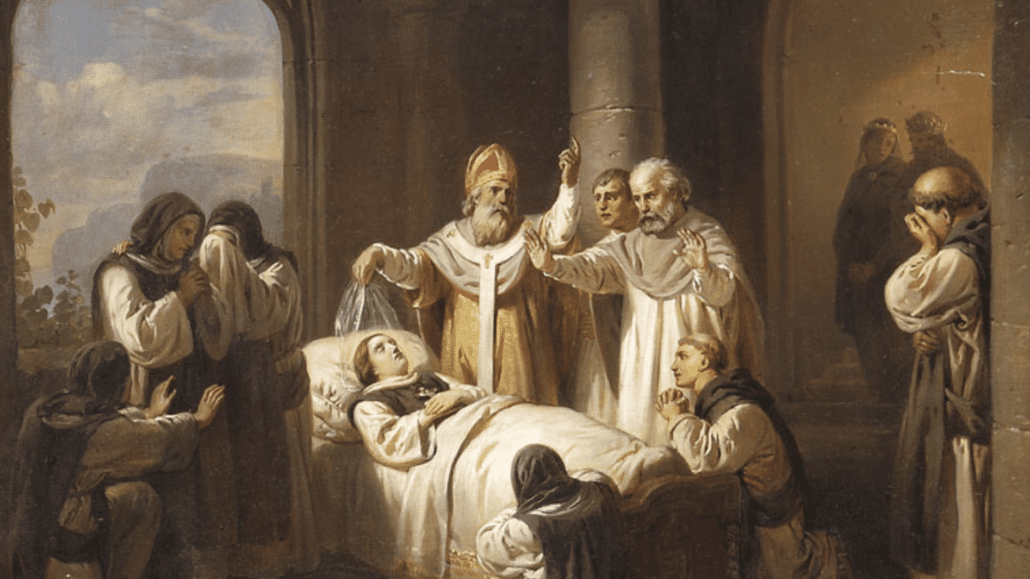My friend’s mother had a stroke three and a half years ago and, somehow in all the confusion, received the Sacrament of Anointing of the Sick four times in as many days. Now 87, she survived—her mind intact but the left side of her body frozen. She now lives in a nursing home. I asked her recently if she remembers being anointed. “Yes,” she said. “What do you remember?” “I lived.”
The Sacrament of Anointing of the Sick used to be called “the Last Rites” or “Extreme Unction” because the usual recipient was a dying person. Many Catholics still carry cards or wear medals so that, if they are in an accident, a priest is called to administer the sacrament.
But since the Second Vatican Council, the sacrament is not just for those in imminent danger of death, but for all Catholics whose “health is seriously impaired by sickness or old age” (Rite, #99). It’s usually not held simply with the priest and the person to be anointed, but is often celebrated in parish settings, homes and nursing homes, with family and friends in attendance. It’s now focused on trust in God—for whatever happens—and on healing—in whatever form that may take.
What are the parts of the sacrament?
The sacrament itself has three distinct parts: the prayer of faith, the laying-on of hands, and the anointing with oil.
In the prayer of faith, it is the whole community, the People of God, who pray for God’s help for the sick person. And if one member suffers, all share in those sufferings. This community aspect is why parishes now often hold communal celebrations of the sacrament. Sometimes it is combined with a Mass for healing. (There are also prayer services for healing that do not involve the sacrament.)
The laying-on of hands recalls Jesus’ manner of healing: “They brought the sick with various diseases to him; and he laid hands on every one of them and healed them” (Luke 4:40). The gesture indicates that this particular person is the object of the Church’s prayer of faith. It is a sign of blessing and an invocation for the coming of the Spirit.
Anointing with oil signifies healing, strengthening and the presence of the Holy Spirit. In biblical times, oil was used to massage athletes to fortify them for the race ahead. In the sacrament, the forehead and hands are anointed, and sometimes additional parts of the body, such as txhe area of pain or injury. (The pre-Vatican II ritual used also to anoint the feet, but that’s been omitted.)
After the disciples were first sent out by the Lord to continue his healing ministry, “They anointed many sick people with oil and cured them” (Mark 6:13).
The early Church continued this practice (James 5:14-15). As the ritual for Anointing outside of Mass says: “My dear friends, we are gathered here in the name of our Lord Jesus Christ who is present among us. As the gospels relate, the sick came to him for healing: moreover, he loves us so much that he died for our sake. Through the apostle James, he has commanded us: ‘Are there any who are sick among you? Let them send for the priests of the Church, and let the priests pray over them, anointing them with oil in the name of the Lord; and the prayer of faith will save the sick persons, and the Lord will raise them up; and if they have committed any sins, their sins will be forgiven them’” (Rite, #117).
Where is Jesus in the sacrament?
Throughout the ritual there is an emphasis on Jesus the healer, the forgiver of sins and the source of all strength to accept and endure whatever comes. God is addressed as “God of all consolation.” One of the readings that may be used is Matthew 11:25-30, which asks us to have childlike confidence in the goodness of God that will bring us the “rest” that only Jesus can give. The healing prayed for is “in body, in soul and in spirit,” and for delivery “from every affliction.” When the priest anoints a person’s forehead with blessed oil, he prays: “Through this holy anointing may the Lord in his love and mercy help you with the grace of the Holy Spirit.” When the hands are anointed, he says: “May the Lord who frees you from sin save you and raise you up.” Both of these call for an “Amen” response.
The most beautiful prayer from the ritual may be the one used after the anointing: “Father in heaven, through this holy anointing grant N. comfort in his/her suffering. When he/she is afraid, give him/her courage, when afflicted, give him/her patience, when dejected, afford him/her hope, and when alone, assure him/her of the support of your holy people” (Rite, #125A).
Some of the alternates are wonderful, too. For example, the prayer for advanced old age asks: “God of mercy, look kindly on your servant who has grown weak under the burden of years…. Keep him/her firm in faith and serene in hope, that he/she may give us all an example of patience and joyfully witness to the power of your love” (Rite, #125D).
And the prayer for anointing a child is poignant: “Caress him/her, shelter him/her, and keep him/her in your tender care” (Rite, #125F).
This is usually followed by the Our Father, that most perfect prayer of trust in God, in which all present join in.
And the ritual’s concluding blessing asks the God who gives consolation and healing to “fill your heart with peace and lead you to eternal life’ (Rite, #130C).
How does the sacrament make us feel better?
I can attest that participating in the Sacrament of Anointing in the past has strengthened people in these trying days. I know that the many times my friend’s mother has received the Sacrament of Anointing have fortified her for the suffering and helplessness she feels. Sometimes she is angry at God for not having called her home yet, she’s admitted to me. I keep telling her that God knows what he’s doing—even if we don’t.
Is a person’s age the primary qualification to receive this sacrament?
A person’s age is not the primary factor in receiving the Anointing of the Sick. The 1972 ritual indicates that it is for “Christians whose health is seriously impaired by sickness or old age” (97). Ideally, this sacrament should be celebrated while the person receiving it is conscious and is accompanied by relatives and friends.
The ritual specifies that this sacrament may be repeated: “a) when the sick person recovers after being anointed and, at a later time, becomes sick again; b) when during the same illness the condition of the sick person becomes more serious.
“In the case of a person who is chronically ill, or elderly and in a weakened condition, the Sacrament of Anointing may be repeated when in the pastoral judgment of the priest the condition of the sick person warrants the repetition of the sacrament” (102).
People of all ages, including children, who suffer from a serious illness or are facing major surgery can be anointed.









7 thoughts on “Understanding the Sacrament of Anointing of the Sick”
I have been so anointed several times over the last many years. Each time for a different health problem that has come to me. And each time, I’ve felt God’s love come into my heart so strongly. The forgiveness of any sins from anointing is secondary to me, but is definitely so welcome. I have felt lifted and so much closer to God with each anointing. If you or a loved one may be in danger, please see your priest about being anointed.
Please Jesus give me the strength to choose the righteous path even though I get thoughts of vengeance towards people who have much to do with my beautiful son vincent death! He was pure! Never learned any type of malice! I miss Vincent! I some times want to take vengeance but, I know i would be committing another sin! I need to be in a state of humididilty! Please keep me in the righteous path. Amen
Such a wonderful and comforting Sacrament, thank you Jesus for your example of healing for us, and to our priests for continuing in your footsteps. Amen
Amen,Scacred Heart of Jesus,I place all my trust in thee.Please Heavenly Father look down on me and give me grace with.m the Holy Spirit, in Jesus name
Amen.
I am bi-polar ànd am suffering from fibromyalgia which is so very painful and I am on very strong meds I also have iñsomnia, which worsen,s everything, Please pray for my husband Maurice who could have a very frightening consultantation on Tuesday. Please 🙏 pray for us both. Iñ Jesus name
Amen Please give us Grace and strength,I Holy Father.
Amen,all praise and glory to your name 🙏🌹
Please pray for me . I’ve had 35 surgeries. Ten back surgeries after service in Iraq. I’ve been suffering for over 36 years. I have congestive heart failure, lupus, anemia, high blood pressure, copd and asthma. I’m Greek Orthodox and I’m alone, and I’m in a lot of pain. I desperately need healing, anointing and deliverance from my afflictions. I live alone. I am alone. My name is Helen. Please God help and deliver me in you’re powerful name, Amen
Helen, I’m sorry for your pain. May God send you grace, faith and healing. I’m in Jesus presence now at Eucharistic adoration. I will ask him to help you.
Yours,
V